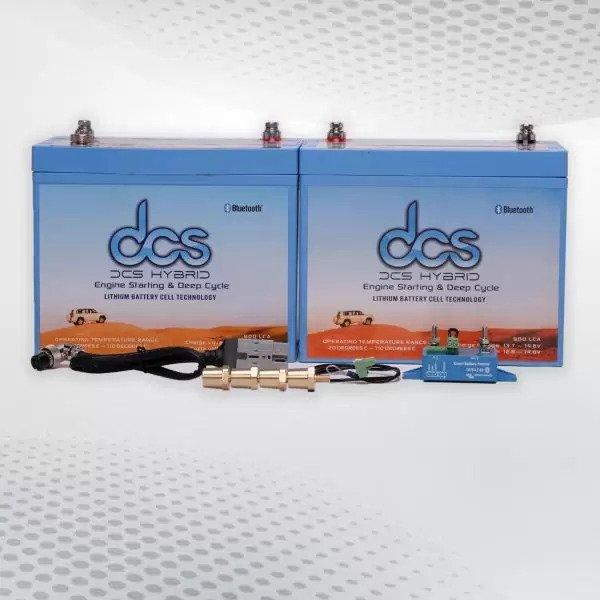Lithium Battery may seem like a mundane part of our everyday lives, but the truth is that they have revolutionized technology in ways we never could have imagined. From powering our smartphones and laptops to being used in electric vehicles and renewable energy systems, these small powerhouses have truly transformed the way we live and work. In this blog post, we’ll explore the uses of lithium batteries and how they have become an essential part of our modern world.
Understanding Lithium Batteries: The Basics and How They Work
Lithium batteries are small, lightweight power sources that have completely revolutionized the world of technology. But how exactly do they work?
At their core, lithium batteries are made up of several key components. First, there is the anode, which is typically made of lithium or a lithium compound. The cathode, on the other hand, is usually made of a metal oxide. These two electrodes are separated by a liquid electrolyte, which allows for the flow of ions between them.
When a lithium battery is charged, lithium ions from the cathode move through the electrolyte and are absorbed by the anode. This process is reversible, meaning that when the battery is discharged, the lithium ions move back to the cathode. This movement of ions creates an electric current that can power a wide range of devices.
What makes lithium batteries so special is their high energy density. This means that they can store a large amount of energy in a small and lightweight package. Additionally, lithium batteries have a low self-discharge rate, meaning that they can hold their charge for extended periods of time without losing significant power.
Various Applications of Lithium Batteries in Everyday Technology
Lithium batteries have found their way into a wide range of everyday technology, enhancing our lives in ways we may not even realize. One of the most common uses of lithium batteries is in our smartphones and laptops. These devices require a compact and powerful energy source that can handle long hours of use, and lithium batteries fit the bill perfectly. Without lithium batteries, our beloved gadgets would not be as portable, efficient, and long-lasting as they are today.
But the applications of lithium batteries go beyond our personal devices. They have become an integral part of medical equipment, such as pacemakers and insulin pumps, ensuring that these life-saving devices can operate reliably and safely for extended periods. Lithium batteries also play a crucial role in the field of aerospace, powering satellites and spacecraft, where the weight and efficiency of the battery are of utmost importance.
In addition, lithium batteries are making waves in the automotive industry. Electric vehicles (EVs) rely on lithium batteries to provide the energy needed for long drives without emitting harmful emissions. These batteries allow EVs to compete with traditional internal combustion engines, offering a greener alternative for transportation.
Furthermore, lithium batteries are being used in renewable energy systems, such as solar and wind power installations. These batteries store excess energy generated during peak production periods and release it when demand is high, ensuring a more stable and efficient power supply.
From smartphones to electric vehicles and renewable energy systems, lithium batteries have become an essential component in a wide range of everyday technology. Their small size, high energy density, and long-lasting charge make them an ideal choice for powering our modern world. The continued advancement and utilization of lithium batteries will undoubtedly pave the way for even more exciting applications in the future.
Why they’ve Become an Integral Part of Modern Tech?
Lithium batteries have quickly become an essential component in modern technology, and for good reason. Their advantages and benefits have propelled them into the forefront of power sources, making them an integral part of our everyday lives.
One of the primary advantages of lithium batteries is their high energy density. They can store a significant amount of energy in a small and lightweight package, making them perfect for portable devices like smartphones and laptops. With lithium batteries, we can enjoy long-lasting power without the burden of carrying around heavy and bulky battery packs.
Another advantage of lithium batteries is their long-lasting charge. They have a low self-discharge rate, meaning they can hold their charge for extended periods of time without losing significant power. This feature is especially useful in applications like medical equipment and emergency devices, where reliability is crucial.
Furthermore, lithium batteries have a fast charge time compared to other types of batteries. This means we can spend less time waiting for our devices to charge and more time using them. This quick charging ability is particularly beneficial for busy individuals who rely on their devices throughout the day.
In addition to these advantages, lithium batteries are also environmentally friendly. They do not emit harmful emissions or contribute to air pollution, making them an ideal choice for green energy systems and electric vehicles. With lithium batteries, we can reduce our carbon footprint and work towards a more sustainable future.
Overall, the advantages of lithium batteries have made them an indispensable part of modern technology. Their high energy density, long-lasting charge, fast charging capability, and environmental friendliness have propelled them into widespread use in a variety of applications. As technology continues to evolve, lithium batteries will continue to play a vital role in powering our increasingly interconnected world.
Lithium Battery Pack
Lithium battery packs are the heart and soul of many of our portable devices and gadgets. These battery packs consist of multiple lithium batteries connected in a series or parallel configuration to provide the necessary power output. They are designed to be compact, lightweight, and easy to transport, making them ideal for a wide range of applications.
The lithium-battery pack is often encased in a protective housing, ensuring that the batteries are shielded from external elements and are safe to handle. The housing also helps in efficient heat dissipation, preventing the batteries from overheating during use.
The capacity of a lithium-battery pack can vary depending on the specific application. For personal devices like smartphones and laptops, the capacity may range from a few thousand milliamp-hours (mAh) to several thousand mAh. On the other hand, for larger devices like electric vehicles and renewable energy systems, the capacity can be in the kilowatt-hour (kWh) range.
The battery management system (BMS) is another crucial component of a lithium battery pack. The BMS monitors and controls the charging and discharging process, ensuring the batteries are operated within their safe operating limits. It also provides features like cell balancing and temperature regulation to optimize the performance and lifespan of the batteries.
The Role of Lithium Batteries in Green Energy and Electric Vehicles
Lithium batteries have proven to be a game-changer in the field of green energy and electric vehicles. Their high energy density and long-lasting charge make them the ideal choice for powering these sustainable technologies.
In the realm of green energy, lithium batteries play a vital role in storing the excess energy generated by renewable sources such as solar and wind power. These batteries act as reservoirs, capturing the energy produced during peak production periods and releasing it when demand is high. This allows for a more stable and efficient power supply, reducing our reliance on fossil fuels and contributing to a greener and more sustainable future.
But it doesn’t stop there. Lithium batteries are also powering the electric vehicle revolution. With their ability to store a large amount of energy in a compact and lightweight package, lithium batteries are crucial for providing the power needed to propel electric vehicles on long drives. Not only do these batteries enable zero-emission transportation, but they also offer the convenience of quick charging and longer driving ranges.
Potential Downsides and Safety Concerns Related to Lithium Batteries
While lithium batteries have revolutionized technology and brought about numerous benefits, it is important to also consider the potential downsides and safety concerns associated with their use. One of the primary concerns with lithium batteries is the risk of thermal runaway or overheating. If a lithium battery is damaged or exposed to high temperatures, it can lead to a rapid release of energy, resulting in fires or explosions. To mitigate this risk, manufacturers have implemented various safety features, such as built-in thermal sensors and protection circuits, to prevent overheating and overcharging. However, it is still crucial to handle and store lithium batteries with care, ensuring they are not exposed to extreme temperatures or physical damage.
Another concern is the environmental impact of lithium batteries. While they are more environmentally friendly compared to traditional battery technologies, they still require the extraction and processing of lithium, which can have environmental implications. Additionally, the disposal of lithium batteries requires proper recycling methods to prevent the release of hazardous materials into the environment.
It is also important to note that lithium batteries have a limited lifespan and will eventually degrade over time. This means that they will not hold their charge as effectively, resulting in reduced performance and capacity. Proper maintenance and usage, such as avoiding extreme temperatures and optimizing charging practices, can help prolong the lifespan of lithium batteries.
FAQs
Here are some common questions about lithium batteries:
Q: Are lithium batteries rechargeable?
A: Yes, lithium batteries are rechargeable. They can be charged and discharged multiple times without significantly affecting their performance or lifespan.
Q: Can lithium batteries explode?
A: While there have been rare cases of lithium batteries catching fire or exploding, manufacturers have implemented safety features to minimize this risk. It is important to handle and store lithium batteries properly to prevent damage or exposure to extreme temperatures.
Q: How long do lithium batteries last?
A: The lifespan of lithium batteries can vary depending on usage and maintenance. Generally, they can last several years with proper care. Over time, lithium batteries will naturally degrade and hold their charge less effectively.
Q: Can lithium batteries be recycled?
A: Yes, lithium batteries can and should be recycled to minimize their environmental impact. Many recycling centres accept lithium batteries for proper disposal.
Q: Can I use any charger with a lithium battery?
A: It is recommended to use chargers specifically designed for lithium batteries. Using an incompatible charger may lead to overcharging or other safety risks.
Conclusion
In today’s modern world, it is clear that lithium batteries have become an essential part of our everyday lives. These small powerhouses have revolutionized technology in ways we never could have imagined. From powering our smartphones and laptops to being used in electric vehicles and renewable energy systems, lithium batteries have transformed the way we live and work.



